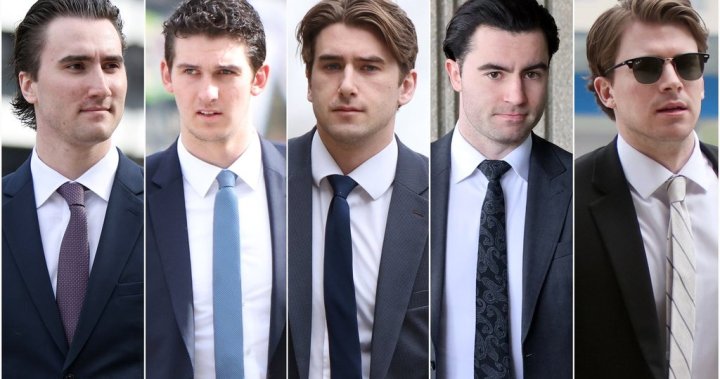Five former members of Canada’s 2018 World Junior Hockey Team—Michael McLeod, Carter Hart, Alex Formenton, Dillon Dube, and Callan Foote—are currently on trial in London, Ontario, facing sexual assault charges related to an incident following their gold medal celebration gala in June 2018. The complainant, whose identity remains protected by a publication ban, has testified about consuming alcohol throughout the evening and alleges non-consensual sexual assault by McLeod at a downtown hotel. The accused have pleaded not guilty, and the trial continues with additional testimonies from former teammates and witnesses amid heightened public scrutiny of sexual assault cases in Canadian junior hockey.
The trial concerning the alleged sexual assault involving five former players of Canada’s 2018 World Junior Hockey Team has drawn significant attention across the country. The incident allegedly occurred following the team’s gold medal celebration gala in June 2018 in London, Ontario. The complainant, protected under a publication ban to preserve anonymity, detailed her experience during testimony presented in court. She described consuming alcohol throughout the evening and recounted an event at a downtown hotel where she alleges that Michael McLeod engaged in non-consensual sexual activity.
All five accused players—Michael McLeod, Carter Hart, Alex Formenton, Dillon Dube, and Callan Foote—have entered not guilty pleas. The defense maintains that the encounters were consensual, and they have challenged the credibility and details of the complainant’s statements.
Details of the Allegations and Testimonies
The complainant testified about the sequence of events that followed the team’s high-profile celebration. According to her account, the consumption of alcohol was a significant factor affecting her awareness and consent. The prosecution has emphasized this context as central to their case, arguing that the accused took advantage of the complainant’s impaired state.
Additional testimonies have been heard from various witnesses, including former teammates and others present during the night in question. These statements aim to corroborate aspects of the complainant’s testimony or provide alternate perspectives on the events.
Public and Community Reactions
The case has resonated deeply within Canadian junior hockey circles and beyond, highlighting ongoing concerns regarding sexual misconduct in sports environments. Advocacy groups and community leaders have called for greater accountability and improved education around consent and abuse prevention in athletics.
The trial proceedings have been closely followed by media and the general public due to the high profile of the individuals involved and the sensitivity of the allegations. Legal experts note that the case underscores the importance of thorough judicial processes in handling sexual assault claims, particularly in contexts involving prominent figures.
Legal Context and Proceedings
Sexual assault cases in Canada require the prosecution to prove that any sexual activity was without consent beyond a reasonable doubt. The legal definitions of consent and capacity to consent, especially when alcohol is involved, are often central to such trials.
The court continues to hear testimonies and review evidence as part of a comprehensive examination of all facts related to the allegations. The outcome will depend on the weight of evidence presented, adherence to legal standards, and the interpretations made by the judge or jury.
Conclusion
As the trial progresses, it remains a significant case within the landscape of Canadian sport and legal proceedings related to sexual violence. The testimonies and evidence brought forward aim to provide clarity and justice in an emotionally charged and complex matter. Updates and further developments will continue to be reported as the trial unfolds.
The ongoing trial of five former members of Canada’s 2018 World Junior Hockey Team brings critical attention to issues of consent and accountability within sports communities. With serious allegations of non-consensual sexual activity, the case underscores the importance of a fair and thorough judicial process to determine the facts amid complex and sensitive circumstances. As proceedings continue, the outcome will have implications not only for those involved but also for broader discussions on sexual misconduct prevention and support for survivors in Canadian athletics. The public and stakeholders await further developments as the trial unfolds, reaffirming the need for justice and transparency in addressing such allegations.

